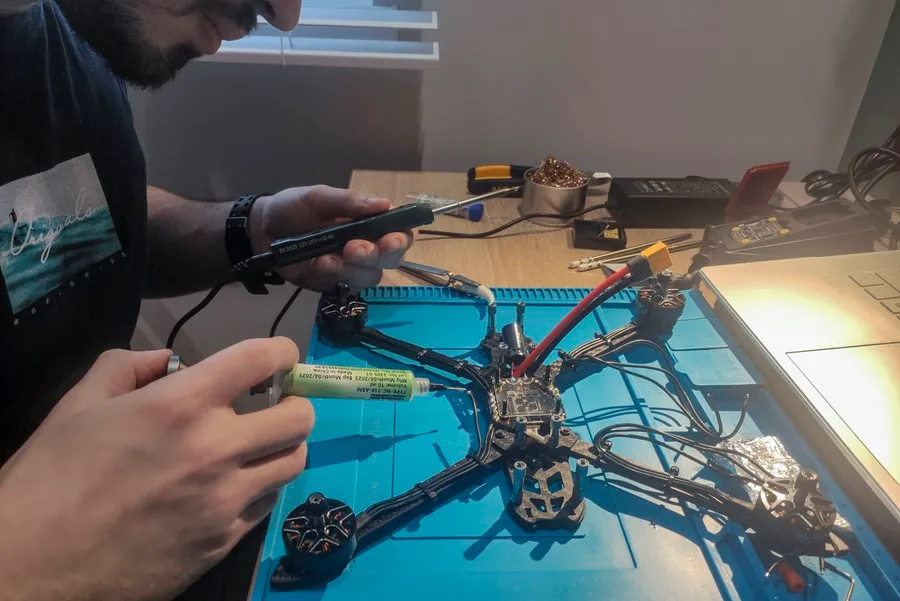International
Ukraine finds in technology its best ally for war

Ukraine has found in technology its best ally for war, with a commitment to innovation that makes the difference both on the battlefield and in the daily lives of millions of citizens who have to live with the invasion.
In a conflict that from the beginning has been compared to a fight between David and Goliath, the “slingshot” of Ukraine is technology: hybrids between a missile and a drone to accurately attack Russian bases, robots that evacuate wounded soldiers or kamikaze devices that destroy bridges.
Machines to support troops
“We are trying to fight them with machines because we do not have enough people,” explained the Ukrainian Deputy Minister of Digital Transformation, Alex Bornyakov, in an interview with EFE during the Web Summit, the technology congress held this week in Lisbon.
This commitment to technological innovation allowed Ukraine to destroy part of the Russian fleet in the Black Sea with small kamikaze ships, an “exact example” of the metaphor between David and Goliath, the deputy minister said.
Ukrainian forces also use sentinel drones to monitor a territory, capable of attacking the enemy if necessary; robots that help evacuate soldiers so as not to endanger other companions; and autonomous devices to locate and extract mines.
This year the biggest bet is drone missiles, such as the Palianytsia, with a flight range of between 500 and 700 kilometers and which can be used against targets in Russian territory.
“By next year we are definitely going to produce more of our own missiles,” explained Bornyakov, who explained that the budget for the purchase of drones is around 3,000 or 4 billion dollars.
In addition, they will allocate another 80 million to innovations in Defense.
Technology for day to day
These efforts are not only aimed at the battlefield but also at using technology to help Ukrainians live with the war on a daily basis.
An example is ‘Kiev Digital’, the mobile application that the City Council of the Ukrainian capital launched in 2021 and that since the invasion has become indispensable for the Kievites.
“We notify people that a missile attack is coming. We offer you additional information about where the bomb shelters are, where the target of the attack is, which shelters have Wi-Fi and how to get there,” Oleg Polovynko, who advises the consistory on digitization issues, exemplified to EFE.
The app reports on other consequences of the war such as power cuts but also on the basic services of any city, such as the transport network or online procedures.
18% of the population uses it daily and about 40% weekly, said Polovynko, who assured that Kiev is already a global reference in digital transformation and “all cities have to learn” from it.
Objective: to boost the technological ecosystem
The Ukrainian technological ecosystem is present this year at the Web Summit with more than 80 start-ups, some of them oriented to the Defense sector, such as BeesAM and RMachine, specialized in mines.
Others, such as Inheart.memorial, are dedicated to helping to remember and honor the deceased, with a platform to make digital memorials that allows you to gather biographies, photographs, videos, links to social networks and other resources.
Then a QR is created that is placed next to the tombstones, so that anyone can know their story.
Although the idea emerged before the war, it now includes many pages dedicated to the “heroes,” the CEO of the platform, Oleksander Sydorov, explained to EFE, who pointed out that they have added new features such as the last battle or the medals received.
Promoting the technological ecosystem was already one of the purposes of the Ukrainian Government in 2019, before the invasion, as the deputy minister recalled: “We set ourselves the goal of becoming one of the leading technological hubs in Europe.” The war has accelerated the process.
International
Dominican ‘False Hero’ Arrested for Faking Role in Nightclub Collapse That Killed 231

A man identified as Rafael Rosario Mota falsely claimed to have rescued 12 people from the collapse of the Jet Set nightclub in Santo Domingo—a tragedy that left 231 people dead—but he was never at the scene.
Intelligence agents in the Dominican Republic arrested the 32-year-old man for pretending to be a hero who saved lives during the catastrophic incident, authorities announced.
Rosario Mota had been charging for media interviews in which he falsely claimed to have pulled survivors from the rubble after the nightclub’s roof collapsed in the early hours of April 8, during a concert by merengue singer Rubby Pérez, who was among those killed.
“He was never at the scene of the tragedy,” the police stated. The arrest took place just after he finished another interview on a digital platform, where he repeated his fabricated story in exchange for money as part of a “media tour” filled with manipulated information and invented testimonies.
“False hero!” read a message shared on the police force’s Instagram account alongside a short video of the suspect, in which he apologized: “I did it because I was paid. I ask forgiveness from the public and the authorities.”
Central America
Nicaraguan Exiles to Mark 7th Anniversary of 2018 Protests with Global Commemorations

The Nicaraguan opposition in exile announced on Thursday that it will commemorate the seventh anniversary of the April 2018 protests against the government of President Daniel Ortega and his wife, Rosario Murillo, with events in Costa Rica, the United States, and several European countries.
The commemorative activities—which will call for justice for the victims, as well as freedom and democracy for Nicaragua—will include religious services, public forums, cultural fairs, and other public gatherings, according to official announcements.
In April 2018, thousands of Nicaraguans took to the streets to protest controversial reforms to the social security system. The government’s violent response quickly turned the demonstrations into a broader call for the resignation of President Ortega, who is now 79 and has been in power since 2007.
The protests resulted in at least 355 deaths, according to the Inter-American Commission on Human Rights (IACHR), although Nicaraguan organizations claim the toll is as high as 684. Ortega has acknowledged “more than 300” deaths and maintains the unrest was an attempted coup d’état.
International
Arsenal stun Real Madrid at the Bernabéu to reach Champions League semifinals

Arsenal enjoyed a “historic night” on Wednesday after defeating Real Madrid 2-1 at the Santiago Bernabéu, knocking them out of the Champions League quarterfinals, midfielder Declan Rice said.
“It’s such a special night for this club, a historic night for this club,” said Rice, who scored twice in the first leg in London, speaking to TNT Sports.
The English international was named Man of the Match in both legs — the 3-0 win in London and the second leg in Madrid.
“It’s amazing. I knew we were on an upward trajectory and we’ve done incredibly well in this competition. We deserve it and we have full confidence in our coach. Reaching the semifinals is unbelievable,” Rice added.
-

 International5 days ago
International5 days agoNightclub Collapse in Dominican Republic Claims 226 Lives
-

 International5 days ago
International5 days agoVenezuela accuses Guyana of “warlike intentions” after UK defense deal
-

 Central America3 days ago
Central America3 days agoHonduran Police Offer $135K for Tips Leading to the Arrest of Romeo Vásquez
-

 Central America3 days ago
Central America3 days agoPetro questions Ecuador’s vote, cites reports of military control and arrests
-

 International3 days ago
International3 days agoMPV Denounces Electoral Blockade as Secretary-General is Disqualified for May Elections
-

 International2 days ago
International2 days agoArsenal stun Real Madrid at the Bernabéu to reach Champions League semifinals
-

 International3 days ago
International3 days agoMaduro Plans Major Workers’ March on May 1st to Defend Venezuela’s Freedom
-

 International2 days ago
International2 days agoBogotá residents line up for yellow fever vaccine amid national alert
-

 International2 days ago
International2 days agoMexico refuses to restore ties with Ecuador while Noboa remains in office
-

 International2 days ago
International2 days agoDeSantis’ immigration crackdown sparks alarm in Venezuelan Communities in Doral
-

 International3 days ago
International3 days agoColombia: Search continues for missing limb of italian scientist found dismembered
-

 International14 hours ago
International14 hours agoDominican ‘False Hero’ Arrested for Faking Role in Nightclub Collapse That Killed 231
-

 Central America14 hours ago
Central America14 hours agoNicaraguan Exiles to Mark 7th Anniversary of 2018 Protests with Global Commemorations















